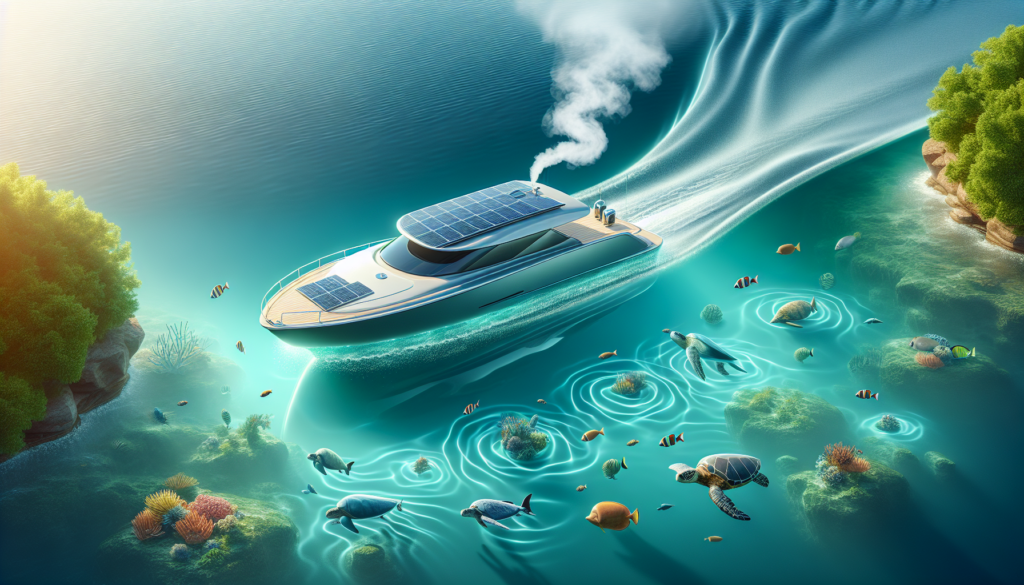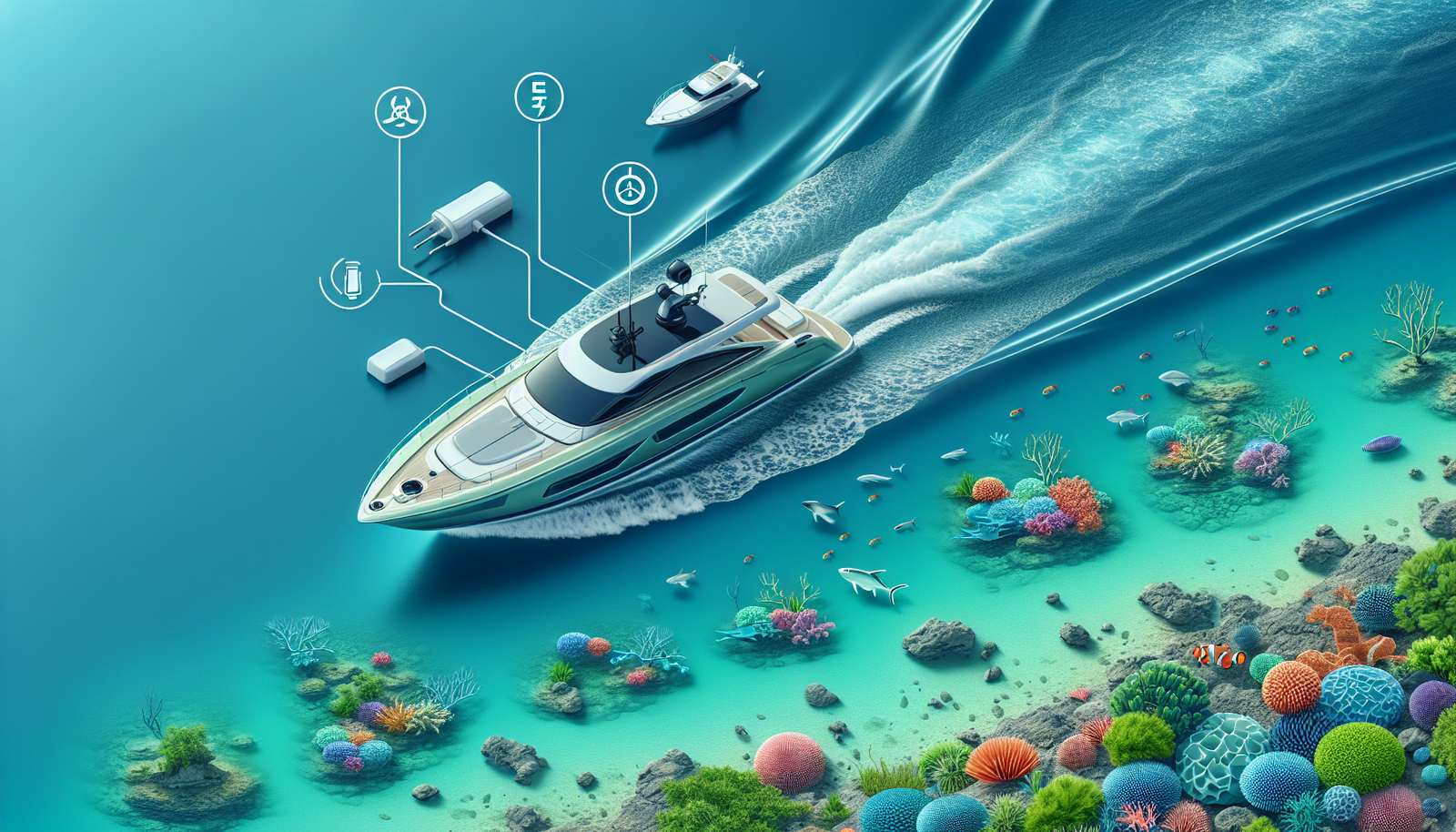Navigating through the ebbs and flows of today’s environmental concerns, you’ll be excited to hear about a gentler, nuanced way to sail the open waters. That’s where the significant benefits of electric and hybrid boat engines come into the picture. Right from reducing noise pollution to minimizing carbon emissions, these ingenious advances in marine technology are setting the course for a new age of eco-friendly seafaring. This article will enlighten you on the myriad ways these advanced engines are making a positive impact on our environment while ensuring an unhampered boating experience.

Understanding Electric and Hybrid Boat Engines
The world of boating doesn’t have to be dominated by traditional, emissions-heavy engines. There’s a new world of options out there for those who want to enjoy the water in a greener way. We’re talking about electric and hybrid boat engines. They’re not as commonly used as their traditional counterparts just yet, but they’re on the rise. Let’s start by understanding what these engines are all about.
Definition of Electric Boat Engines
An electric boat engine operates solely on electricity. It’s equipped with an electric motor, which uses energy stored in batteries to function. The motor turns a propeller, which propels the boat. Now, you’re probably thinking about longevity. How long can a boat really last on battery power alone? That’s an excellent query and a valid concern. Technological advancements have led to significant improvements in the lifespan and capacity of boat batteries – we’ll delve into this later.
Definition of Hybrid Boat Engines
Hybrid boat engines, as the name implies, are a bit of a mix. They typically run on both a conventional combustion engine and an electric motor. Ideally, the boat functions on electric power at lower speeds and switches over to fuel when a speed boost or extra power is needed. The plus is that this hybrid system can also recharge the electric batteries while running on diesel or gasoline, making them a convenient middle ground.
Differences Between Electric, Hybrid, and Traditional Boat Engines
Electric, hybrid, and traditional boat engines all serve the same purpose – to propel a boat – but they do so in significantly different ways. Traditional boat engines rely solely on diesel or gasoline for power. Hybrid engines offer a combination of conventional and electric power. And electric engines? They run purely on electricity.
In terms of emissions, traditional engines are undoubtedly the worst offenders and have a significant impact on the environment. Electric engines, on the flip side, produce zero emissions, which makes them the greenest alternative. Hybrid engines fall somewhere in between.
Reasons for the Rise in Popularity of Electric and Hybrid Boat Engines
It’s clear that electric and hybrid boat engines are on the uptrend, but why exactly?
Increase in Environmental Awareness
As society becomes more conscious of the consequences of pollution and climate change, more people are choosing eco-friendly alternatives. Electric and hybrid boats are a part of this green revolution. They offer a sustainable method of enjoying marine activities without damaging the environment.
Advancements in Technology
Tech advances have played a substantial role in making electric and hybrid boats more appealing. We now have batteries that can store more power, engines that are highly efficient, and systems designed to maximize the use of alternative energy sources.
Government Policies and Regulations
Government legislation and pressure from environmental organizations are also pushing boat manufacturers and owners to consider alternative engines. Nobody wants to be fined or penalized for being environmentally unfriendly. Therefore, it isn’t just being “green” that’s driving this shift, but also the need to comply with standards and regulations.
Environmental Benefits of Electric Boat Engines
Electric boat engines aren’t just a trend; they’re an ideal solution for environmentally-friendly boating, and here’s why.
Zero Emission
Electric boat engines do not produce any emissions. They simply contribute to zero pollution in the environment, unlike conventional diesel or petrol engines that emit carbon dioxide and other harmful gases. This characteristic makes electric engines incredibly valuable in preserving our environment.
Energy Efficiency
Electric motors are known for their high energy efficiency. They can convert a higher percentage of electrical energy into mechanical energy compared to traditional combustion engines. As a result, less energy is wasted, leading to improved boat performance and reduced environmental degradation.
Ease in Energy Source Transition
If you’re using an electric boat engine, the energy source transition becomes a breeze. Electric engines can be powered by any source of electricity. So, if we shift to 100% renewable energy in the future, electric boats will be more than ready for the transition.
Reduced Noise Pollution
Electric boats are virtually silent, making them fantastic for reducing noise pollution. This trait is particularly valuable in serene marine reserves or residential lakes, where noise can be especially disturbing to both residents and wildlife.
Environmental Benefits of Hybrid Boat Engines
Hybrid boat engines also branch out environment-friendly benefits,
Lower Emission Rates
While they are not completely emission-free, hybrid engines do have significantly lower emission rates than traditional engines. This could help reduce the impact of boating on the environment.
Greater Energy Efficiency than Conventional Engines
Just like electric engines, hybrid engines tend to be more efficient. They use the electric motor at low speeds and the combustion engine at higher speeds, balancing the energy usage.
Balancing Power and Efficiency
Hybrid boats can efficiently balance between power and efficiency. For instance, if you’re heading out for a leisurely sail, you can take advantage of the quieter, low-emission electric engine, switching to the combustion engine then the extra power is required.
Adds to Biodiversity Protection
With the reduced air and noise pollution from hybrid boats, fragile marine ecosystems are well-protected. This supports biodiversity and helps protect marine species.

Operational Benefits of Electric and Hybrid Boat Engines
There are several operational benefits to using electric and hybrid boat engines.
Reduced Fuel Consumption
One of the most obvious benefits of using electric or hybrid engines is a reduction in fuel consumption. This can significantly cut down your boating costs in the long run.
Lower Operational Costs
With fewer moving parts, electric and hybrid engines often have lower operational, repair, and maintenance costs. Electrics, for example, lack many of the parts that conventional engines have that are prone to wear and tear, like the ignition and exhaust systems.
Increased Engine Life Expectancy
Because they have fewer parts and generate less heat, electric and hybrid engines can potentially have a longer lifespan than traditional engines. This factor makes them a good investment for the future.
Smoother and Quieter Operation
The operation of electric and hybrid engines is smoother and quieter compared to traditional engines. This leads to a more enjoyable boating experience.
Comparing Electric and Hybrid Boat Engines with Traditional Engines
When it comes to boat engines, it’s good to know how electric and hybrid compare to traditional engines.
Emission Comparison
Electric engines have zero emissions, hybrid engines have reduced emissions, and traditional engines produce high levels of emissions. The difference in environmental impact is clear and substantial.
Fuel Efficiency Comparison
In terms of fuel efficiency, electric and hybrid engines come out on top again. They use energy more efficiently, reducing the overall amount of energy required.
Performance and Speed Comparison
While electric engines may not provide the same top speed as traditional engines, they do offer constant torque, meaning they can achieve maximum power instantaneously. Hybrid engines, with their dual power sources, can offer the perfect balance between performance and efficiency.
Maintenance and Durability Comparison
Electric and hybrid engines usually require less maintenance and have longer life expectancies compared to conventional engines, thanks to having fewer moving parts and generating less heat.
The Role of Electric and Hybrid Engines in the Fight against Climate Change
Choosing an electric or hybrid boat plays a small but significant role in fighting climate change.
Reduction in Carbon Footprint
Using electric or hybrid boats contributes to the reduction of carbon footprint. The more we can decrease carbon emissions, the better we’ll be able to combat the devastating effects of climate change.
Supporting Renewable Energy Usage
By choosing electric boats, you support and promote the use of renewable energy. As the world transitions to renewable energy sources, electric boats will be ready to make the switch.
Promoting Sustainable Aquatic Tourism
Electric and hybrid boats can aid in promoting sustainable aquatic tourism, an industry that generates significant revenue but can also cause major damage to marine ecosystems if not managed sustainably.
Constraints and Solutions in Adopting Electric and Hybrid Boat Engines
Like any technology, there are constraints when it comes to widespread adoption of electric and hybrid boats. However, solutions are also on the horizon.
Initial High Costs
Electric and hybrid engines often have higher up-front costs compared to conventional engines – but the operational savings, in the long run, could balance this out.
Availability of Charging Stations
The availability of charging stations is another constraint, especially for electric boats. However, as the electric vehicle market expands, we can expect the infrastructure to continue improving.
Developing More Efficient Battery Technologies
Battery technology is continuously evolving, with research and developments aiming to increase lifespan, decrease charging times, and make batteries lighter and more efficient.
Strategies for Wider Adoption in Maritime Industry
Government initiatives and regulations that encourage the use of eco-friendly boats could play a key role in promoting wider adoption. These could be in the form of tax incentives or subsidies for electric and hybrid boat owners.
Future Perspectives on Electric and Hybrid Boat Engines
Looking into the crystal ball, the future of electric and hybrid boat engines looks promising.
Predicted Market Growth
As awareness of the importance of eco-friendly alternatives increases, the market for electric and hybrid boats is expected to grow accordingly. Strong market growth would also likely spur further advancements in the technology.
Technological Developments and Innovations
The world of technology is fast-paced. We can expect steady advancements in the efficiency, functionality, and affordability of electric and hybrid boat engines.
Expected Regulatory Changes
Due to increasing environmental concerns, regulatory bodies are expected to promote cleaner fuels and mandate stricter emission standards, which would likely favor electric and hybrid boats.
Examples of Effective Usage of Electric and Hybrid Boat Engines
Real-world application of new technology is always helpful in diffusing skepticism.
Case Studies of Successful Adoption
Numerous cases are proving the successful adoption of electric and hybrid boats. For instance, some marine tour operators have completely switched to electric boats for their operations.
Boat Types Suitable for Electric and Hybrid Engines
Nonetheless, not all boats are fit for an electric or hybrid engine. Smaller boats and those used for short trips or regular, low-speed cruising are suitable for electric engines. Larger boats and those used for long-distance travelling and higher speeds can benefit from hybrid engines.
Testimonials of Users and Operators
Many who have made the switch to electric or hybrid boats have shared testimonials regarding smoother and quieter operations, reduced fuel and maintenance costs, and the joys of making a positive environmental impact.
In conclusion, while it’s still early in the game, there’s a growing body of evidence that suggests electric and hybrid boat engines are the future of boating. They offer a sustainable way to enjoy marine activities and have a huge potential to revolutionize the boating industry.

